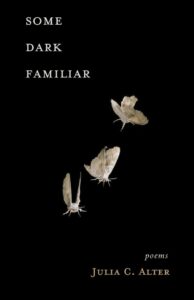 Review by Rebecca Jane
Review by Rebecca Jane
Some Dark Familiar holds nothing back, but charges, full force, into the reader’s interior with hard truths about how reality behaves when a woman chooses to be a new, single mother. Poignant images take aim and hit their target: “Now I sit in this body of the mother: / part straightjacket, part hot-air balloon” (6). These poems navigate womanhood, especially when we are mothers and feel “sucked into the storms of our anatomy.” Julia C. Alter won the 2023 Sundog Poetry Book Award for this remarkable collection. Alter received an MFA from the Vermont College of Fine Arts; numerous journals and prizes have recognized the merit of Alter’s work, including Hunger Mountain, Sweet Lit, Atlanta Review, and a long list of fine journals.
Some Dark Familiar reveals Alter as a poet with sensitivity to and compassion for the beauty inside the messiness of life. Poems deal with themes of pervasive ennui, non-monogamy, parenting with strangers, struggle to claim a sense of freedom, terminating pregnancy, and courage to choose alternatives to the status quo.
Each poem delivers smashing impact, similar to the way rock music stuns listeners into devastation and awe. Sure, there is the dark familiar place of a mother’s womb; but, other places make unforgettable appearances here, too: a PEX Valentine’s party in Philly; the bathroom, sitting on a toilet while a toddler sits on a training potty, and we’re imaging we’re in outer space, throwing a banana; places inside the mind: “I build a temple of death and go to pray in it” (66).
Yes, paradigms are challenged, especially that of heterosexual monogamy. A series of poems inquire into non-monogamy, not with apology or sentiment, but with straightforward declaration. Meetings with sexual partners add tension and release; a mother walks casually, unafraid to earn money she doesn’t need, exposing her anus while appeasing her sexual appetite, or maybe she is gaining self-knowledge. The poems move back and forth between mothering scenes and fucking scenes, a mind embraces the entanglement, shared custody between duty and desire.
“Some Idea” is a poem that reveals ways dissociation complicates womanhood—a thought of something never equals the actual thing. In striving to reach essence, there is a reminder:
A reminder to come from round things,
from squish and from circles. From the pulsing
middles of whole shells. I came from slimy openings.
I count up every petal and find my own
mathematical flower, the part of me that wants
numbers, existing shapes, correct things.
To slink all the way back through that
divine portal. What’s the opposite of a mother? (37)
Mommies, there’s “the beat drop at the bottom of the world” (20). Woman, he’s with another lover, so dance alone when the beat drops, and see moths rise around you (39). A reader understands the courage it takes to raise a child while making choices that a woman must always be free to make.
This collection gives voice to women who choose to build lives that do not need to conform to norms and standards. It gives free expression to sexuality and sensuality, desire, longing, and loneliness. Reading these poems transports the reader to a cabin where she spills seed. Her sovereignty is more than lyrical, and also primordial, and also rhythmic.
Let strain give way to freedom when parenting is new and strange, and the world is aggressive with its diseases, recreational drugs and sex, fierce judgements, and crazed gunman.
And when a single mother gets pregnant again, and makes the only choice that feels sensible to her, we are welcome in territory that feels familiar to every mother:
I try to model kindness for my son,
who goes on hitting me and screaming
that he hates me while I try to love
the ways he stumbles over being human
Julia Alter’s Some Dark Familiar is not a collection for the faint of heart but for those who are ready to be honest about the reality of today’s reproductive landscape.
In the poem “Roden Crater,” she names her dejected state as she walks through a museum, “pretending to feel something” likening her impassiveness to “acquiring an extinct volcano.” But, notice the hope when she walks outside in “the type of / sunlight that makes you want to be / the highest leaf on the tree” (45). The joy of being—whether mother, son, lover, or stranger—rushes in, through surprising lines that orient us to what is truly important and real and to “the way we’re all queer miracles” (57).
Some Dark Familiar by Julia C. Alter
Green Writers Press, April 9, 2024, 96 pages, $16.95, paper
ISBN: 9798989178490
Rebecca Jane is the author of She Bleeds Sestinas, which was a finalist for a Best Book Award in 2023. She works as a freelance writer, ghostwriter, and poet who travels to Asia to study yoga, Sanskrit, and Mandarin. She lives with her daughters on unceded Kumeyaay land. (San Diego, California).
